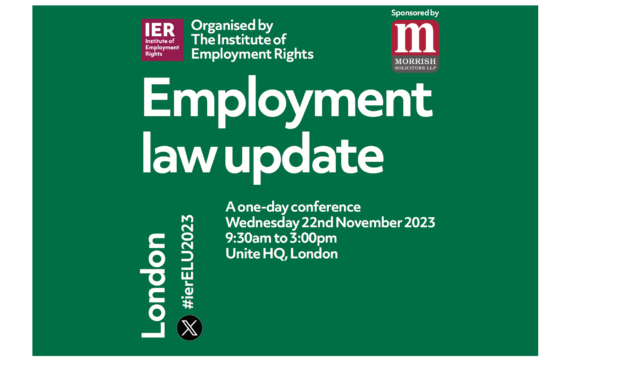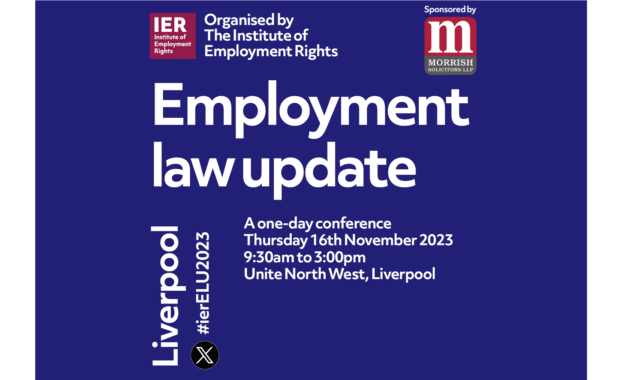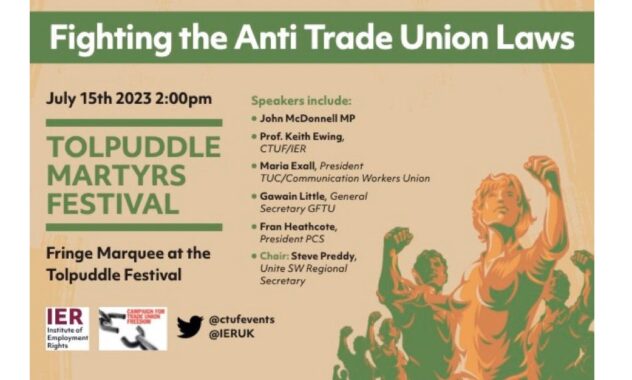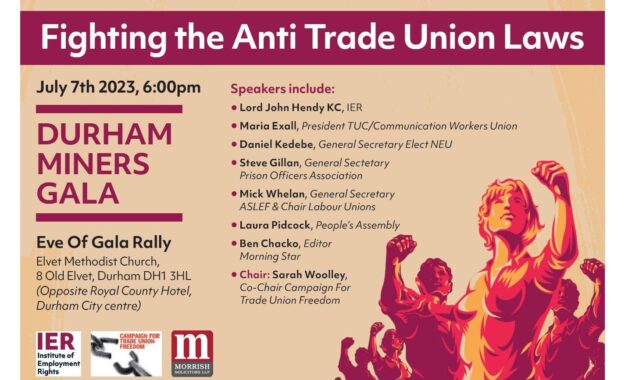Employment Law Update 2019 – London
A report on our recent conference covering changes to employment rights in 2019.

Conference report

By Roger Jeary
Nerys Owen, Labour Research Department, opened the Institute’s conference by welcoming delegates and thanking Unite for the use of their facilities. Nerys set the scene for the Conference by referring to the recent decision of the courts to overturn the strike ballot of the CWU which determined that the ballot was in technical breach of the regulations. This, she told Conference, was indicative of the ways in which industrial democracy was being undermined. Against this background, and other issues Nerys welcomed the first speaker from Thompsons Solicitors.
The good work plan: good enough?
Neil Todd from Thompsons Solicitors addressed the issues raised in the government’s legislation entitled the “Good Work Plan”, its response to the recommendations made in the independent, Taylor review 2017, of modern working practices. He acknowledged the change in political circumstances since the report’s publication at the end of 2018. The Taylor review arose out of the ‘gig’ economy and other concerns around low productivity and disadvantages experienced by women and younger workers. He said the “Good Work Plan’ fell well short of what was needed. However Neil highlighted some positive proposals from the Plan including the closing of the loophole that prevented agency workers from earning the same pay as permanent staff, better protections for agency workers by setting out more clearly key information about their work assignment. It also provided a requirement for all workers to receive a written statement of particulars from day one of work, but Neil emphasised that these were fairly minor changes. Improvements to ICE Regulations and increases in the penalties tribunals can order employers to pay for breach of employment rights where a tribunal claim succeeds were also included.
Neil alerted delegates to huge areas where the government had failed to act. Employment status had not been clarified as recommended by Lord Taylor, yet this is the door to access employment rights. The Plan also made no mention of a ban on zero hour contracts, nor greater access for trade unions to workplaces or Tribunal Fees. He contrasted this with the proposals from the Labour Party on future rights for workers and trade unions. Neil considered it a gross over-estimation to say that the plan makes any significant difference to the rights of workers in the gig economy or elsewhere. He then reminded conference of the rights existing in the UK as a result of the EU directives. On Brexit, he questioned the effectiveness of the political declaration that Theresa May’s ‘agreement’ contained about workers’ rights but the text now agreed under Johnson’s deal was significantly worse. He argued that the only way to protect workers’ rights, in the event of leaving the EU, would be a legally enforceable standstill to prevent regression below current standards and a system for guaranteeing alignment in the future.
Surveillance at work
Second up was Paul Scholey from Morrish Solicitors, who updated delegates on the developments in surveillance and monitoring in the workplace. Paul began by referring to the TUC report ‘I’ll be watching you’ from August 2018 which he commended and drew attention to a number of the facts contained in the report. He also pointed to the recommendations in the report that trade unions should be consulted in advance on the use of monitoring and surveillance at work.
Turning to current legislation relating to this subject, Paul explained that the law was extensive and that ACAS had also produced useful guidance on the issue. He also referred to the ICO website and the guidance of the Employment Practices Code which was fulsome. He went on to refer to the Human Rights Act and in particular Article 8 which provides a right to family and private life, however he pointed out that these were limited and qualified. Court cases had established that the right to privacy extended to the workplace but in many cases employers’ rights trumped the individual rights.
In more recent cases, Paul pointed to decisions which included a case where the use of a private mobile phone contents in a disciplinary hearing was found to be in order by the ECJ. Cases had also determined that the use of cameras monitoring theft in the workplace in the workplace were found originally to be illegal until overturned by the Grand Chamber in Europe. Paul also mentioned the use of covert recording of meetings and the decision in Phoenix House v Stockman which set out a range of circumstances in which covert recording may be accepted.
In a case in Scotland (BC and others v Chief Constable Police Service of Scotland and others, 2019) the courts found that a WhatsApp private group’s right to privacy was trumped where a regulatory provision overrided the applicants’ right to privacy.
Paul ended by referring to cases on live facial recognition which have been commented upon by the ICO very recently, recommending consideration of uses of technology like live facial recognition and ow far should we, as a society, consent to police forces reducing our privacy in order to keep us safe?”
Case law overview 2019
Following a coffee break, we heard from Stuart Brittenden and Madeline Stanley from Old Square Chambers who presented a case law overview of 2019. The presentation covered an extensive range of cases and subject matters. These included issues relating to collective law updates as well as individual rights. Stuart began with references to recent developments on the issue of collective bargaining inducements and the impact of Kostal UK Ltd v Dunkerley & Ors (2019). The final judgement of the Court of Appeal was against the union on the grounds that the offer was made on one occasion, Stuart suggested that this was contrary to the Wilson v Palmer judgement. Application by the union has been made for permission to appeal to the Supreme Court.
He continued on the issue of industrial action and referred to a BALPA Case against British Airways which established a sympathetic stance towards trade unions on the need for categorisation and period of industrial action. Similarly the high court found in favour of BALPA against Ryanair on eligibility to vote in ballot, and other matters. Although there was a timely reminder in the current CWU case and Royal Mail of the ability of the courts to seriously undermine trade union democracy.
Madeline then addressed individual rights and specifically started with the definition of automatic unfair dismissal on the basis of a prohibited reason. She posed the question of what happens if the dismissing officer is not motivated by the prohibited reason, referring to a recent Supreme Court decision in Jhuti v Royal Mail Group Ltd which has determined that in this case the hidden decision was the reason for dismissal rather than an invented reason. Madeline added a note of caution regarding the practical consideration of the Supreme Court decision as it included a clause that stipulated that “in most cases ETs will not need to look beyond the decision maker”. She suggested that this may be used by ETs to prevent future claimants using the decision in seeking to argue that the tribunal should look beyond the decision maker.
Article 8 of the European Convention of Human Rights 1950 (ECHR)
The final speaker before lunch was Paul Draycott of Doughty Street Chambers who addressed the issue of unfair dismissal in the context of Article 8 of the European Convention of Human Rights 1950 (ECHR). He referred to the Beecroft proposals on unfair dismissal, such as no rights if less than 10 employees. He asserted that the Beecroft proposals were likely to return in the event of a Johnson government being re-elected. He argued that such proposals would be in contravention of Article 8 ECHR and that there were signs from the Supreme Court that claims may be sympathetically heard.
Paul then outlined the provisions of the HRA 1998 and suggested that a violation of Article 8 in public sector cases would mean that there would be no lawful reason for dismissal. Paul’s presentation focussed on the right to respect for private life and its influence on unfair dismissal claims. He illustrated his arguments through the case of Turner v East Midlands Trains Limited [2013] which he had been personally involved in. The Court of Appeal whilst recognising that Article 8 could be engaged found no breach in this case. The right to appeal to the Supreme Court was not allowed.
Paul questioned whether the band of reasonable responses was compatible with Article 8 and raised doubts as to whether this was consistent with European Court of Human Rights case law, referring to recent case decisions.
State surveillance of trade unionists
Following the lunch break the conference heard from Dave Smith from the Blacklist Support Group on the subject of State Surveillance of trade unionists. Dave outlined his own background in the construction industry. He also emphasised that the government and the state were not the same thing. He reminded the conference of the background to the blacklisting activities in the construction industry and the role of the Consulting Association in collating the details of trade unionists for the purpose of excluding them from workplaces.
Dave then moved onto the purpose of his presentation, state surveillance. Through evidence collected, he made clear that some information on the files of workers didn’t come from employers but from state institutions. He referred to the Undercover Policing Public Enquiry set up by Theresa May in March 2015. The inquiry includes a trade union strand which provides ‘core participant status’ to, amongst others, FBU, Unite, and the Blacklist Support Group and 8 individual trade unionists.
Dave talked about his interface with undercover police/agents during the course of his working life. These individuals had infiltrated the trade union movement over a number of years. A police inquiry (Operation Reuben) into allegations has now come to light and it shows that there are a number of police political units dedicated to spying on ‘leftist’ groups including trade unionists as well as campaigning groups and political parties.
Dave reminded the conference that there is a public belief that these sort of things ‘don’t happen here’. His evidence would suggest otherwise.
Questions and answers followed the presentation which included evidence from activists who themselves had been spied upon by undercover police. It was asserted that almost all of those organisations that had been spied upon were of the radical left and indicated a political stance adopted by the state. Demands are being made for release of information from the public enquiry and delegates’ attention was drawn to campaigning websites among which were:
www.campaignopposingpolicesurveillance.com
www.policespiesoutoflives.org.uk
www.spycops.co.uk
The modernisation of employment tribunals: what do the claimants want and need
Unfortunately Judge Brian Doyle (President of tribunals in England and Wales) was unable to speak to the Conference due to illness. In his absence, the conference gathered thoughts from delegates on changes to tribunals from a claimants perspective that were needed. The following suggestions were made:
-Return to tripartite panels for unfair dismissals
-Simplify procedures and extend timelines to 6 months
-Provision of interpreters for applicants who struggle with English language
-Review of costs process
-Lack of Witness expenses
-Provision of legal representation as a default.
It was agreed to forward these to Judge Doyle for information.
The presentation Judge Doyle would have made can be downloaded here.
Download event documents
- Brian-Doyle-presentation-1.pdf - 163.42 KB
- Dave-Smith-presentation.pdf - 131.68 KB
- Neil-Todd-presentation-1.pdf - 229.27 KB
- OSC-presentation-1.pdf - 581.40 KB
- Paul-Draycott-presentation-papers-1.pdf - 255.07 KB
- Paul-Scholey-presentation-3.pdf - 2.32 MB








